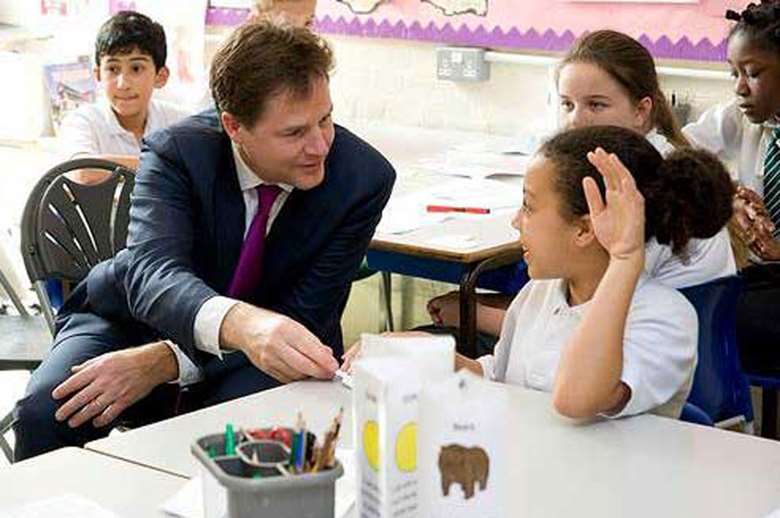Plan to ditch EYFS Profile in favour of 'baseline' test at the start of Reception
Catherine Gaunt
Wednesday, July 17, 2013
The EYFS profile could be scrapped and replaced by a formal test when children start school.

In proposals put out for consultation today, children will be assessed using ‘a baseline check’ when they start Reception.
Nick Clegg also announced changes to testing at 11 to prepare children for secondary school, which would measure the progress they had made during primary school.
The consultation asks for suggestions as to when the baseline would be set, for example, at the age of seven or ‘a simple check of a child’s ability’ in the early weeks of when they start school.
The Deputy Prime Minister also confirmed a substantial rise in the Pupil Premium for disadvantaged primary school children, which will increase from £900 to £1,300 a year from 2014/2015.
The move to make the EYFS Profile non-statutory follows Sir Michael Wilshaw’s comments last month that the EYFS Profile provides a "weak basis for accountability" in its current form and called for "a major change" in the approach to assessing the early years.
Jan Dubiel, national development manager for training and resource company Early Excellence, said that the content of the baseline assessment in Reception and the way it would be carried out were key.
‘It needs to be based on observation and not adult-directed. The content of what is actually assessed and the process is critical.’
Commenting on reports that the tests would include sitting a child at a computer and asking them whether they could point to a carrot, he said, ‘If a child can’t recognise a carrot what are you going to do with that information? Are you going to have vegetable identifying tests?’
He said that if the EYFS Profile is no longer used, ‘The demonstration of progress would have to be compared with Key Stage 1, so that would influence assessment in Reception.’
‘Year 1 teachers use the Profile data really effectively to support children,’ he added.
Mr Dubiel pointed out that prior to the introduction of the EYFS Profile baseline assessment used to occur during the first seven weeks of children starting Reception.
The consultation document states, ‘A baseline check early in Reception would allow the crucial progress made in Reception, Year 1 and Year 2 be reflected in the accountability system and would reinforce the importance of early intervention. The EYFS would remain in place but, to avoid increasing the assessment burden, we could make the EYFS Profile non-statutory. We would welcome views on the most appropriate point for the baseline to measure pupils’ progress.’
Commenting on the plans, the Pre-school Learning Alliance has voiced concerns that a Government plan to introduce testing of children at the age of five in England appears to be part of a growing trend of "schoolification" pressures on early years.
Neil Leitch, chief executive of the Alliance, said, ‘We recognise the importance of identifying early support but are concerned that this will be used for other purposes, which we anticipate the sector would vigorously oppose.’
Mr Leitch added, ‘We are concerned that early years and childcare appears to be coming increasingly under top-down pressure from a schools-driven formal education agenda around getting children ready for school. Such "schoolification" is inappropriate for young children and does not take account of their age and stage of development.’
‘We have consistently argued that the principles of the EYFS should be extended to the end of Key Stage 1 at age seven as this would give a better foundation for children’s formal learning thereafter.
‘That the future of the EYFS Profile, which gives an appropriate assessment of children’s progress at the summer after their fifth birthday, looks to be in doubt only a year after it was reviewed, is a matter of concern to the sector, as it could be the first stage in the dismantling of the EYFS. We do not want to see the introduction of policies into early years that risk damaging young children’s learning and development.
‘We will be consulting with members and look forward to an objective consultation without a pre-determined outcome.’
Tests at 11
The plans, unveiled today by the Deputy Prime Minister, also include changes to the way that children are assessed at the age of 11 to prepare children for secondary school.
The coalition Government is proposing that from 2016 primary schools will need to have at least 85 per cent of their 11-year-olds expected to reach a good level of attainment. Children would be tested on maths, reading, spelling, punctuation and grammar. The science test for a sample of pupils would continue.
Each pupil would be compared against their peers nationally in ten per cent bands and children’s positions would be available to parents and schools.
Commenting on the plans Deborah Lawson general secretary of Voice, the union for education professionals, said, ‘This serves no useful purpose. It would put unnecessary pressure on children and demoralise many pupils and parents, while giving dinner party bragging rights to pushy parents with high scoring offspring.
‘Mr Clegg claims that this is not about publishing a "name and shame league table", but that’s exactly what would happen and it could even penalise improvement.
‘Such a scheme could penalise pupils in lower "bands" who had actually achieved more in terms of effort and improvement than "higher ranking" children.
‘I am concerned that these proposals will not actually improve ‘secondary school readiness’ but could have the opposite effect.
'Children are individuals, not statistics. You can’t increase the academic ability of children by threatening them and their schools with percentages. Not everybody can be "above average".’
- The consultation, Primary assessment and accountability under the new national curriculum, closes on 11 October.




